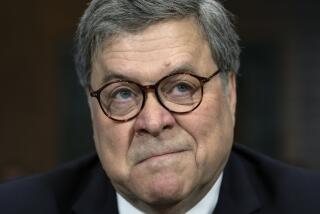Rehnquist Can’t Recall 1969 Memo : Plan Proposed Army Surveillance of Anti-War Protesters
- Share via
WASHINGTON — Chief Justice-designate William H. Rehnquist says he has “no recollection” of writing a draft Justice Department memo in 1969 in which he proposed Army surveillance of civilian anti-war protesters.
Rehnquist also said he could not recall “any participation” in formulating policy on use of the Army to conduct surveillance or collect intelligence on civilians.
Rehnquist’s comments, obtained by the Associated Press, were given in writing recently to Sen. Charles McC. Mathias, a member of the Senate Judiciary Committee. Mathias (R-Md.) was in the majority in the panel’s 13-5 vote Aug. 14 to recommend the nominee’s confirmation by the full Senate.
The memo, which also includes a detailed plan for use of the military in quelling a civil disturbance, could have a bearing on the continuing battle by Senate liberals to derail the nomination.
Little Prior Knowledge
One of their major issues is Rehnquist’s failure to disqualify himself--as a Supreme Court associate justice in 1972--from a legal challenge to the surveillance program by its civilian targets.
Rehnquist told senators during his confirmation hearings that he stayed on the case--casting a crucial vote in the 5-4 decision against the protesters--because he had little knowledge beforehand of the facts in dispute.
The draft memo was among internal Justice Department documents written by Rehnquist and given to the Judiciary Committee at the request of Democratic senators. By coincidence, Democratic Judiciary Committee staffers learned that the memo had been disclosed in 1974 Senate testimony by Robert Jordan, former general counsel of the Army.
Jordan had testified, “I find in the files a March 25, 1969, memorandum from Bill Rehnquist, assistant attorney general (Office of Legal Counsel) to the attorney general and the deputy attorney general.
“This represents the first formal Justice draft of the civil disturbance plan intended for the President’s approval.”
‘No Recollection’ of Role
Mathias asked Rehnquist, “What was your personal role in the preparation of this document?”
Rehnquist answered: “I have no recollection of my personal role in the preparation of this document. From the text of the transmittal memo I assume that the plan was primarily drafted by staff members in my office and in the Office of the General Counsel of the Army, and reviewed by me.”
According to a Senate Judiciary Committee report of 1976, use of the Army in the surveillance program at a time of large anti-Vietnam War protests was approved over the military’s objections by the Nixon Administration--although the language from Rehnquist’s draft was changed to remove specific reference to the Army.
The plan was rescinded in June, 1970, a year after its authorization, after public exposure and congressional criticism.
More to Read
Get the L.A. Times Politics newsletter
Deeply reported insights into legislation, politics and policy from Sacramento, Washington and beyond. In your inbox twice per week.
You may occasionally receive promotional content from the Los Angeles Times.










